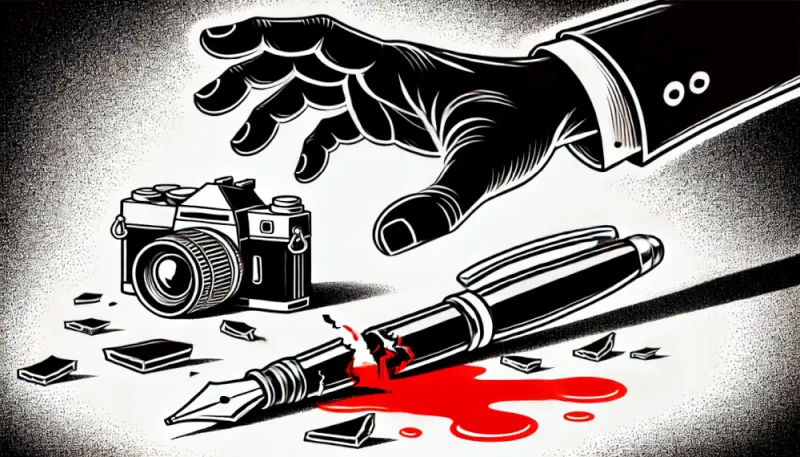 illustration: Bing AI
illustration: Bing AIThe Committee to Protect Journalists (CPJ), in its report "2024 Impunity Index: Haiti and Israel Top List of Countries Where Journalist Murders Go Unpunished," underscores the alarming global issue of impunity for journalist murders. The analysis, covering September 1, 2014, to August 31, 2024, reveals that 80% of journalist murders remain unresolved. The findings confirm that press freedom faces severe threats.
Haiti and Israel Under the Spotlight
Haiti and Israel ranked first in CPJ`s Impunity Index. In Haiti, the issue has persisted for years. Since 2014, the murderers of six journalists have evaded justice. The report highlights that authorities often ignore attacks on journalists, and the weakness of state institutions worsens the problem.
Israel’s appearance on the list was unexpected. For the first time since CPJ began its analysis in 2008, Israel has ranked in the index. The country has one of the highest impunity rates for journalist murders relative to its population. CPJ’s analysis points to two unresolved cases of targeted journalist killings, including the high-profile death of Shireen Abu Akleh and others killed while covering conflicts.
A Global Impunity Problem
CPJ’s report reveals that impunity is not limited to Haiti and Israel. Globally, 80% of journalist murders go unpunished. This means that for every ten journalist murders, only two result in prosecutions.
Global Data in Numbers:
- 263 journalists killed in the last 10 years.
- 210 cases remain unsolved.
- 41 countries included in CPJ`s analysis.
Countries with the Highest Impunity Rates:
| Rank | Country | Unresolved Murders | Population (millions) | Years in Index |
|---|---|---|---|---|
| 1 | Haiti | 7 | 11.7 | 2 |
| 2 | Israel and Palestinian Territories* | 8 | 14.9 | 1 |
| 3 | Somalia | 9 | 18.1 | 17 |
| 4 | Syria | 11 | 23.2 | 11 |
| 5 | South Sudan | 5 | 11.1 | 10 |
| 6 | Afghanistan | 18 | 42.2 | 16 |
| 7 | Iraq | 11 | 45.5 | 17 |
| 8 | Mexico | 21 | 128.5 | 17 |
| 9 | Philippines | 18 | 117.3 | 17 |
| 10 | Myanmar | 8 | 54.6 | 3 |
Tragic Implications for Press Freedom
Impunity for journalist murders undermines the foundations of press freedom. According to the "2024 Impunity Index," investigative journalists, who often expose corruption, human rights abuses, and criminal networks, are most at risk. For instance, in Mexico, 31 journalists were murdered in recent years, with none of the cases fully resolved.
CPJ also notes that the lack of consequences for perpetrators has a chilling effect on journalists. Many avoid reporting on sensitive topics to protect their lives. The report highlights cases in India where local journalists are targeted for exposing corruption and abuses of power.
The Need for International Action
The authors of the report call on the international community to take decisive action. They argue that only global pressure on governments in countries like Haiti, Israel, and Mexico can improve the situation. The report suggests strengthening support for journalists in conflict zones and increasing pressure to enforce international press protection standards.
The full report is available at:
https://cpj.org/thematic-reports/haiti-israel-most-likely-to-let-journalists-murders-go-unpunished
COMMERCIAL BREAK
New articles in section Law in media
Dietary supplement ads in Poland. Who keeps influencers in check?
Newseria, KFi
One in three Polish internet users considers influencer recommendations when deciding on medicines and dietary supplements. Although promotion of such products is regulated, there are still cases of advertising that skirt the law.
SEO Poisoning. Hackers Use Search Engines to Target Businesses
Piotr Rozmiarek
Search engines help us quickly find information, but they can also be used by cybercriminals. SEO poisoning is a tactic where attackers manipulate search engine rankings to place harmful websites at the top of search results.
Phishing in the Cryptocurrency Industry. Fake Recruitments Steal Data
Piotr Rozmiarek
Security researchers have detected a social engineering campaign targeting job seekers in the Web3 industry. The attack aims to conduct fake job interviews via a meeting application that installs information-stealing malware.
See articles on a similar topic:
Hate in the Polish Internet. IRCenter Study
Krzysztof Fiedorek
The proportion of hate speech victims is inversely proportional to the age of internet users. The study authors point out that this is directly influenced by the fact that older generations are instilled with the principles of respectful discussion and use the internet less frequently.
How South Asian Governments Manipulate Media. IFJ Report
Krzysztof Fiedorek
South Asia faces significant challenges in maintaining democracy and press freedom. The latest report from the International Federation of Journalists (IFJ), "Artificial Independence: The Fight To Save Media and Democracy," highlights the growing threats faced by journalists, including violence, financial pressures, and censorship.
Cybersecurity Market and Online Privacy in Poland in 2022
BARD
The value of the cybersecurity market in 2022 will exceed PLN 2 billion, according to the latest report by PMR analysts. At the same time, a study by ClickMeeting reveals that over 57% of Poles believe they are already taking proper care of their online privacy.
Cyber Attack on a Corporate Smartphone. How to Protect Yourself
KrzysztoF
Internet-connected mobile devices are an attractive target for cybercriminals. The key to protecting sensitive business data is employee awareness, hardware solutions, and appropriate software. This mini-guide provides a quick overview of how to protect each of these areas.






























